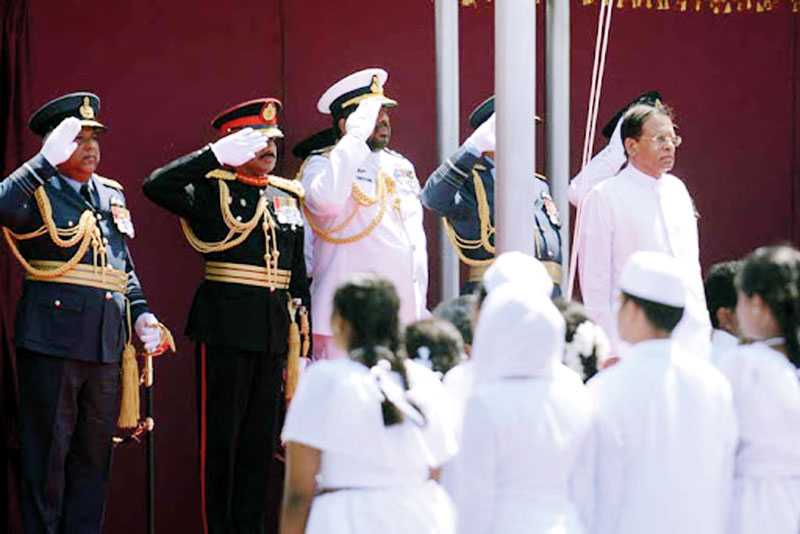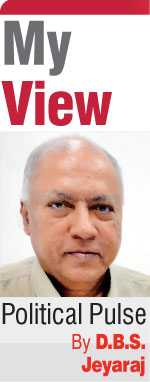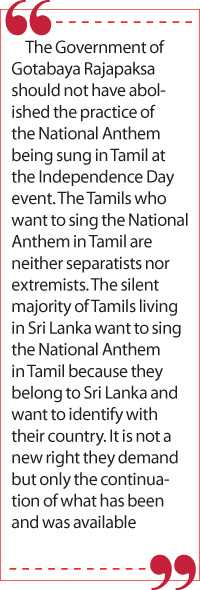Tuesday Feb 17, 2026
Tuesday Feb 17, 2026
Thursday, 4 February 2021 00:30 - - {{hitsCtrl.values.hits}}

The positive practice of singing the National Anthem in both Sinhala and Tamil at the official Independence Day celebrations was ushered in by the Government of President Maithripala Sirisena and Prime Minister Ranil Wickremesinghe in 2016. Pictured are Sinhala, Tamil and Muslim school children dressed in white singing the Tamil version of the National Anthem at the end of the celebrations, after 67 years. The last time the National Anthem was sung in Tamil was in 1949
 It was widely reported in the media early this week that the National Anthem would be sung in Sinhala only at the official celebrations of Sri Lanka’s 73rd anniversary of gaining independence from Britain.
It was widely reported in the media early this week that the National Anthem would be sung in Sinhala only at the official celebrations of Sri Lanka’s 73rd anniversary of gaining independence from Britain.
Defence Secretary Maj. Gen. Kamal Gunaratne made it unambiguously clear at a press briefing that the National Anthem would not be sung n Tamil at the official freedom day event. Even though Tamil is the language spoken by around 25% of the island’s population comprising the Sri Lankan Tamils, Muslims and Up Country Tamils and is a Constitutionally-approved official language of Sri Lanka, the language was to be excluded at the official celebrations of conducted by the State.
The official announcement by Gen. Gunaratne made it clear to the Tamil-speaking of people in Sri Lanka that their language would only be afforded inferior status in their own motherland. The Government of Gotabaya Rajapaksa would be catering mainly to the perceived interests of the numerically majority community speaking Sinhala and mete out shabby treatment to the three principal ethnic minorities speaking the Tamil language. “Thamizh” despite being a classical language of glorious antiquity would only be treated as a child of a lesser God under the Rajapaksa regime.
Singing the National Anthem in Sinhala and Tamil
The positive practice of singing the National Anthem in both Sinhala and Tamil at the official Independence Day celebrations was ushered in by the much-maligned Government of President Maithripala Sirisena and Prime Minister Ranil Wickremesinghe in 2016.
The 68th Independence Day event saw the National Anthem being sung in Sinhala at the commencement and in Tamil at the closure. Sinhala was given pride of place at the beginning of the ceremony but Tamil too was given its rightful position. This arrangement introduced in 2016 worked very successfully at the Independence Day celebrations of 2017, 2018 and 2019.
Things changed after the advent of President Gotabaya in November 2019. The wholesome practice of singing the National Anthem in Sinhala and Tamil at the Independence Day celebrations was abruptly discontinued.
In a pathetic display of ignorance and arrogance, the Minister of Public Services, Provincial Councils and Local Government Janaka Bandara Thennakoon sought to justify the blatantly discriminatory act. He was quoted by the BBC as having said that the National Anthem being sung in Tamil at the next Independence Day celebrations (2020) was banned.
Speaking further the Minister said a National Anthem was one and should not be split in two. “If the National Anthem were sung in two languages, it would imply there were two races in Sri Lanka. Singing the National Anthem twice would affect reconciliation,” he said.
Thus the 72nd Independence Day celebrations in 2020 saw the National Anthem being sung in Sinhala only. Tamil was excluded. This discriminatory act was criticised widely. So much so that the United Nations High Commissioner for Human Rights Michelle Bachelet chose to mention it in her 17-page report to the United Nations Human Rights Council (UNHRC) this year. In the section on ‘Majoritarian and Exclusionary Rhetoric,’ it was observed as follows:
“She (High Commissioner) notes the Government’s affirmation of the rights of all Sri Lankans and constitutional policies that appear to exclusively reflect the perceived interests of the Sinhala Buddhist majority, and with minimal consideration for minority communities. Ethnic and religious minority communities are left behind and excluded in such official discourse, and often perceived and treated as posing a threat. Such an approach has serious negative implications for reconciliation, peace building and religious tolerance, and carries the seeds of future violence and conflict.”
Among instances noted by the UN Human Rights Chief in this regard was the exclusion of the National Anthem in Tamil. The report stated: “The Government declined to include the National Anthem in the Tamil language on national occasions, such as the Independence Day celebrations, on 4 February 2020, despite the preceding years’ practice of singing it in two languages as a significant gesture towards reconciliation.”
Against this backdrop of the UN Human Rights Commissioner’s rebuke, there were many who thought the Gotabaya Government would reconsider its decision of prohibiting the National Anthem in Tamil at the freedom day event. A Colombo-based Western diplomat told me: “The Government will try to do some damage control on ground before the 46th UNHRC sessions in Geneva in late February. One such possibility is the singing of National Anthem in Tamil. Since Bachelett has been critical of it being sung in Sinhalese only, the Government could allow the Tamil singing on 4 February this year and demonstrate that it is being inclusive.”
Gen. Gunaratne’s official announcement dashed all such hopes and hurt Tamil sentiment.
Mano Ganesan’s hard-hitting statement to Government
Giving vent to feelings of disappointment and resentment felt by the Tamil-speaking people was the irrepressible Mano Ganesan, the Leader of the Tamil Progressive Alliance (TPA). The Colombo District MP issued a hard-hitting statement in Tamil where he chided the Government vehemently for excluding the National Anthem in Tamil at the Independence Day celebrations.
Mano Ganesan said that he had appealed to President Rajapaksa and Prime Minister Rajapaksa to include Tamil also in the singing of the National Anthem to strengthen national reconciliation and promote national integration. He had pointed out that the singing of the National Anthem, praising Mother Lanka in Tamil also at the freedom day event, would make nearly five million Tamil-speaking people feel that they too belong to this country. Ganesan lamented that his request had been spurned by elements leading Sri Lanka backwards to a state of regression.
It may be recalled that Mano Ganesan played a constructive role in enabling the singing of the National Anthem in Tamil during the Sirisena-Wickremesinghe Government. In fact, it was Mano Ganesan who started the ball rolling in gaining recognition for the NA in Tamil after the 2015 regime change.
It was in early March 2015 that Mano Ganesan – who was not an MP then – had raised the issue of the National Anthem being sung in Tamil at the National Executive Council first. Then President Maithripala Sirisena had responded positively and reiterated the constitutional position that there was no bar on the National Anthem being sung in Tamil. He had guaranteed that the National Anthem would be sung in Tamil too. Subsequently Ganesan re-entered Parliament in August 2015, became a Cabinet Minister and worked within Cabinet to ensure the singing of the National Anthem in Tamil.
 Singing the National Anthem in Tamil
Singing the National Anthem in Tamil
It has become fashionable after the regime change ushered in by President Gotabaya Rajapaksa to find fault with the ‘Good Governance’ Government of President Maithripala Sirisena and Prime Minister Ranil Wickremesinghe for various acts of omission and commission. Very little praise is given for the positive measures enacted by that regime. Despite its many faults and flaws, the Sirisena-Wickremesinghe Government did register several constructive achievements.
Chief among them was the climate of Sinhala-Tamil ethnic amity and harmony it brought about. A key factor in this was restoring the practice of singing the National Anthem in Tamil again. This change was best illustrated by the singing of the National Anthem in Tamil at the annual day of independence celebrations. It was the practice from 2016 to 2019 for the National Anthem to be sung in both Sinhala and Tamil at the freedom day event. The ceremony began with singing the Anthem in Sinhala and ended with singing it in Tamil. It was symbolic of the fact that Tamil too was an Official and National Language of this country. Singing the National Anthem in Tamil at the Independence Day event boosted the image of Sri Lanka immensely. It is this very desirable practice that the new Rajapaksa regime under President Gotabaya has now discontinued.
The singing of the National Anthem in Tamil is a matter close to my heart. I was one of those elated by the celebration of Sri Lanka’s 68th anniversary of independence on 4 February 2016. The official commemorative event was held at Galle Face Green. The highlight of the day was the singing of the National Anthem in both Sinhala and Tamil. The following paragraphs are excerpted from the article I wrote about it in the Daily Mirror then:
“During the past decades, I have seen many official commemorations of Independence Day occur. However, for the first time in my life, I witnessed a scene via the internet which I thought would never ever happen during my lifetime. I saw and heard a youthful choir of boys and girls exuberantly rendering the Sri Lankan National Anthem in my mother tongue, Tamil. It took two minutes and 32 seconds. The singers were students of Bambalapitiya Ramanathan Hindu Ladies’ College and Colombo Vivekananda College. They sang harmoniously. After several decades, the National Anthem was being sung with official approval at the State-sanctioned commemoration of independence.
“I was in a state of emotional ecstasy. I did something which I have not done before when Sri Lanka’s National Anthem was being played. I cried! I am not ashamed to say that! I kept replaying the clip. My eyes turned moist and tears trickled down my cheeks. I even sobbed a few times involuntarily. It was with the greatest difficulty that I controlled myself. When the Rupavahini camera panned on the distinguished gathering, I saw those very important children of the Sri Lankan mother – most of them Sinhalese – standing respectfully erect as the words rang out clearly in Tamil. It was truly a defining moment!
“I realised that the land of my birth had embarked on a new and exciting journey. After decades of post-independence conflict, fuelled mainly by ethno-linguistic contradictions, the nation at large was realising and recognising its pluralistic national identity. While Sinhala continued to retain its rightful place, the country was now marching forward on the path of inclusion and was prepared to accommodate what had been excluded before. The 68th Independence Day ceremony was a good omen of the brave, new Sri Lanka that was being envisaged by the new dispensation in power.
“US Astronaut Neil Armstrong, after his historic lunar mission, described his first step on the moon as a small step for a man but a giant leap for mankind. Likewise, the singing of the National Anthem in Tamil at the official Independence Day ceremony is a great leap forward of tremendous symbolic value in the right direction. It is a signal to the long-alienated Tamils of Sri Lanka that it is time for them to come in from the cold and re-enter the national mainstream. The Tamil language recognised constitutionally as an Official Language is now being given parity of status. Tamil is not only spoken by Sri Lankan Tamils but also by upcountry Tamils of recent Indian origin and a substantial number of Sri Lankan Muslims. The language spoken by nearly 25% of the population was granted symbolic recognition at the Independence Day event.
“Above all, the singing of the National Anthem in Tamil at the Independence Day event has conveyed a strong symbolic message to Tamil-speaking people that they and their language are an integral part of evolving Sri Lanka. This has made all those Tamils desiring to live as equals in a united, undivided Sri Lanka very, very, very happy.”
Legal challenges and CPA stance
Shortly after the National Anthem was sung in Tamil on 4 February 2016, a legal challenge was mounted against the move. A Fundamental Rights petition was filed in the Supreme Court. After considering submissions by all parties concerned, a three-judge bench in November 2016 refused to grant leave to provide with the petition,
Meanwhile, Colombo-based NGO Centre for Policy Alternatives (CPA) filed an intervenient petition in the case. A communiqué issued by the CPA stated as follows:
“Sanjeewa Sudath Perera and two others filed a petition dated 26 February 2016 in the Supreme Court challenging the decision to sing the national anthem in Tamil at the official Independence Day celebrations in 2016. The petitioners argued that singing the Anthem in Tamil was contradictory to Articles 7 and 12 of the Constitution which relate to the National Anthem and rights to equality and non-discrimination respectively.
“On 4 March 2016, CPA and its Executive Director Dr. Paikiasothy Saravanamuttu filed an intervention petition which argued that singing the National Anthem in Tamil was constitutional. The petition first referenced Articles 18 and 19 of the Constitution which state that Sinhala and Tamil are Official and National Languages of Sri Lanka. Furthermore, unlike subordinate legislation such as acts of Parliament, the Constitution contains no provision which stipulates that the Sinhala text shall prevail over the Tamil. As such, the words and music of the National Anthem in the Tamil language are constitutionally recognised by Article 7 read with the Third Schedule of the Tamil version of the Constitution.
“The intervention petition further referenced Article 12 of the Constitution claiming that a declaration that the National Anthem be sung only in Sinhalese would be a direct violation of Article 12 which in turn would be a violation of the fundamental rights of Tamil-speaking citizens. The CPA also supported two additional intervention petitions that supported the constitutionality of singing the National Anthem in Tamil.
“The Supreme Court took up the case on 18 November 2016, discussing whether the petitioners made a strong enough case for considering the petition in court. During discussions, the DSG referenced Articles 18 and 19 of the Constitution recognising both Sinhala and Tamil as official and national languages and that the singing of the anthem in Tamil was not in violation of the Constitution. The Court therefore decided that the petitioners had not disclosed a case to be considered and subsequently their case was dismissed.”
GR Government should not have abolished the practice
The National Anthem was sung in Tamil at the Independence Day events of 2017, 2018 and 2019. The precedent set in 2016 seemed to have taken firm root. The people of Sri Lanka were able to see and realise that the singing of the National Anthem in Tamil was not harmful to the country or the Sinhalese majority in any way.
As far as the Tamil people were concerned, the right to sing the National Anthem in Tamil did not mean that all their lost rights were restored and that they had achieved equal status with the majority. Yet, the singing of the National Anthem in Tamil at the Independence Day event was of symbolic value. It indicated bright prospects for equality, unity, harmony and amity in the future.
Alas, a fairy-tale ending was not to be! The return of Rajapaksa rule with Gotabaya Rajapaksa as President has given rise to many drastic changes, both positive and negative. One such ‘negative change’ was the ban on the singing of the National Anthem in Tamil at Independence Day celebrations.
Let me conclude by reiterating that the Government of Gotabaya Rajapaksa should not have abolished the practice of the National Anthem being sung in Tamil at the Independence Day event. The Tamils who want to sing the National Anthem in Tamil are neither separatists nor extremists. The silent majority of Tamils living in Sri Lanka want to sing the National Anthem in Tamil because they belong to Sri Lanka and want to identify with their country. It is not a new right they demand but only the continuation of what has been and was available.
While giving pride of place to the National Anthem in Sinhala, they only want to sing it in their mother tongue wherever and whenever possible or applicable. Singing the National Anthem along with Sinhala at the Independence Day national event is perhaps the best occasion to do so and is of great symbolic value.
(D.B.S. Jeyaraj can be reached at [email protected])